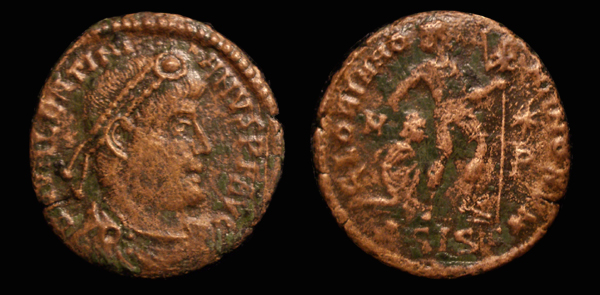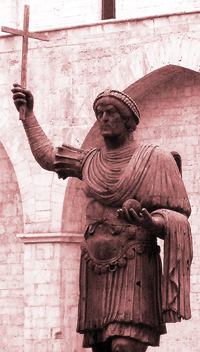
AE3 - IMP VALENTINIAN I
(RIC IX 14a 17 var)
- Siscia Mint
Flavius Valentinianus
Born: 321
Caesar: A.D. 364-375
Obverse: Portrait diademed, draped, cuirassed bust right - DN VALENTINIANVS PF AVG
Reverse: Valentinian dragging captive with Chi Rho Banner - GLORIA ROMANORVM - M - Star over P - ΔSISC
|
Inscriptions: D(ominus) N(oster) VALENTINIANVS P(ius) F(elix) AVG(ustus) / GLORIA (Glory) ROMANORVM (the Romans) M Star over P - ΔSISC (Siscia Mint) Our Lord Valentinian Pious and Happy Augustus / Glory to the Romans - Minted in Siscia This is a coin depicting the Emperor Valentinian. The reverse of the coin shows the emperor dragging a bound captive by the hair, a brutal depiction but one that shows exactly what the emperor undoubtedly wanted to convey to his subjects, a strong triumphant general and emperor who stands against the many enemies of Rome. Valentinian was a soldier first and an emperor second. He was of humble origins born into the turbulent times of the later empire during the Reign of Constantine I. his father Gratian was a career military man eventually rising through the ranks on merit from a staff officer to being trusted with the defense of first Africa and then Britain before political scandal and charges of corruption saw him removed and his property seized by Constantius II on charges of misplaced loyalties. There doesn't seem to have been any doubt that the young Valentinian would follow his father into the military. He served capably and with distinction under Julian II but was dismissed by Constantius II under vague charges of disloyalty having to do with disputes between the Imperial powers at the time. He was then recalled into service under the new emperor Jovian helping to secure that emperors position and was rewarded with the command of the prestigious second Scutarii division, the heavy infantrymen within the imperial household troops. Jovians rule was very short as he was found dead 9 months after taking power. The cause of his death is variously attributed to overeating, the consumption of poisonous mushrooms, accidental suffocation from fumes, and of course the usual calls of murder. In 364 A.D. the armies at Nicaea elected Valentinian to the imperial power and he accepted basing himself in Milan and naming his brother Valens as co-ruler in the East based in Constantinople. The brothers inherited a crumbling empire facing threats from inside and out. Valentinian was a consummate soldier emperor and the task at hand was great. His brother was left to put down Procopius, a usurper in the east, alone as he faced an outbreak by the Alamanni in Gaul, an invasion of Illyricum by the Quadi who claimed to have lost their king and been victims of extortion by the acts of Imperial agents, and all out chaos in Briton with the forces of the Picts, Attacotti, Scots, Franks and Saxons causing havoc in a general uprising. In the end he defeated the Alamanni making peace with their king Macrianus, the future emperor Theodosius would defeat the combined forces in Britain, Valens would defeat Procopius, and the Quadi would be driven back in defeat as well. Valentinian, more often than not, showed good judgment in his military dealings knowing when to accept peace, when to fight and where he and his forces were most needed. Under Valentinian Rome would see some of its last real successes on the field and its last real strong and capable emperor being credited with “reversing the generally waning confidence in the army and imperial defense." Valentinian did not come from an aristocratic family and was not overly found of those who did. They would experience his legendary violent temper as the Roman Historian Ammianus said: 'he hated the well-dressed and educated and wealthy and well-born' and 'he was of a violent and brutal temper, and not only uncultivated himself, but hostile to cultivated persons'. He brought many of Rome's nobles to trial accusing them of everything from witchcraft to adultery in what may have been an attempt to destroy the power and prestige of the senatorial aristocracy. Most of his efforts and successes lay mainly in the military though he was also a founder of schools, and provided medical care for the poor by appointing a physician for each of the fourteen districts of the city. In his rule we see a move further towards autocracy as his court was more of a military chain of command with the emperor at the top appointing men to offices so that power and advancement was gained almost solely by his will as would be the way under the future kings of Europe. Christianity continued its rise under his rule and although an earnest Christian he was largely ambivalent towards the power struggles and politics of the church and the Church seemed to have had a generally favorable opinion of Valentinian. Jerome speaks of him in glowing terms, saying “Valentinian was an excellent emperor in most cases...save only that certain people interpreted his excessive strictness and parsimony as cruelty and greed.” and although he was not uniformly favorable to the Christians, his policy was more often than not to stay out of church affairs save for when money or affairs of state were involved. In the end it would not be war in which this soldier emperor would meet his end but in talks of peace. At Brigetio in Pannonia he met with the Quadi where the two parties agreed that in return for supplying men to the Roman army, the Quadi would be allowed to live in peace. At some point in the meeting the Quadi emissaries made statements that angered the emperor to such a point that he suffered a stroke while yelling at them and died soon after. Valens would rule in the east for 3 more years losing his life in the Gothic wars in the epic battle of Adrianople. Valentinians son Gratian and Half son Valentinian II would jointly succeed their father in the West. |

